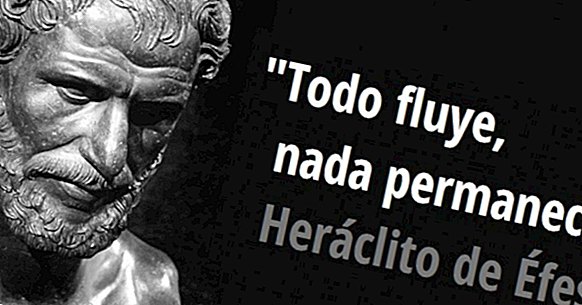The 35 best sentences of Heraclitus, the Greek philosopher
Heraclitus of Ephesus (540 a.C. - 480 a.C.) was a Greek philosopher, also known as "The Dark One of Ephesus." Born in a population of present-day Turkey, he is one of the most studied philosophers prior to Plato, although only a few original writings remain.
The work of this Greek thinker is aphoristic and a great interpretive dowry is necessary to understand his teachings.
- Related article: "The 75 best philosophical phrases of all time"
Great famous quotes and phrases of Heraclitus
In this article we will try to synthesize the philosophy of Heraclitus through his best phrases . They are famous quotes that summarize their knowledge and that reached us through the centuries.
It may interest you:
- "70 phrases of Socrates to understand his thought"
- "The 80 best phrases of Plato and his philosophy"
- "The 100 best phrases of Aristotle the Greek"
1. Nobody bathes in the river twice because everything changes in the river and in the one that bathes.
Perhaps your most studied and commented reflection. Everything is ephemeral, so we can not affirm categorically that an entity remains the same in two different moments.
2. Doctors cut, burn, torture. And making the sick a good, which seems more bad, demand a reward that they almost do not deserve.
On the fearful presumptuous ignorance of doctors.
3. For God everything is beautiful, good and just. Men have conceived the just and the unjust.
It is humanity that conceives the ethical principles of good and evil.
4. The waters that cover those who enter the same river are different.
Another famous appointment of Heraclitus in relation to the mutability of matter.
5. With so much ardor, citizens must fight for the defense of the laws, as for the defense of their walls, not less necessary than those for the conservation of a city.
Defense and order, two basic principles for the subsistence of a civilization.
6. Gold prospectors dig a lot and find little.
Large companies often bring great disappointments.
7. Illness makes health pleasant; hunger satiety; fatigue rest.
Without the less kind face of existence we would not be able to value the joy of living.
8. In the circle the beginning and the end are confused.
Plastic metaphor of great aesthetic and philosophical value.
9. Every man is allowed to know himself and meditate wisely.
The gift of self-reflection. It is only necessary to sit down to meditate on life.
10. If you do not expect the unexpected, you will not recognize it when it arrives.
The unexpected, sooner or later, may arrive. So be alert.
11. Donkeys prefer straw to gold.
The perception of the valuable is not in the hands of anyone.
12. God is day and night, winter and summer, war and peace, abundance and hunger.
Omnipotent and omnipresent. One of the phrases of Heraclitus in which he expresses his vision of the divine being.
13. All human laws are nourished by the divine law.
Human morality is nothing but a confirmation of the heavenly laws.
14. Everything changes; nothing is.
Another famous, very concise quote about the mutability of matter.
15. Death is all that we see awake; I dream what we see asleep.
Beautiful dream phrase with which to reflect.
16. Dogs only bark at those they do not know.
With this famous quote, Heraclitus exhorts us to reflect.
17. The sun is new every day.
It can be interpreted in different ways, but it is likely that Heraclitus pronounced this phrase thinking again about the permanent change of reality.
18. The dry soul is the wisest and the best.
No artifice, no makeup.
19. It is wise to pay attention not to me, but ("to the logos") to the word, and to recognize that all things are one.
A sample of his philosophical monism, a doctrine also supported by Parmenides, Spinoza or Hegel.
20. This world was always, is and will be eternally alive fire.
The flame of existence rarely fades.
21. War is the origin of everything.
Interesting reflection on violence.
22. Dead bodies should be discarded with more reason than manure.
Maybe to prevent the spread of infectious diseases.
23. Nothing is permanent except for the change.
The change is the only thing we can give for accurate and reliable.
24. Do not make people laugh to the point of giving reason to laughter.
Self-respect and composure, very present in the work of Heraclitus.
25. Because without collision forces there are no movements and there is no reality.
In the conflict is the essence and synthesis.
26. If all things became smoke, the noses would discern.
Metaphor to apply to different contexts of life.
27Once born, they want to live and reach their destination, but rather rest, so they leave behind to reach their destination.
On human existence.
28. Erudition does not teach good sense, for it would have been taught to Hesiod and to Pythagoras and even to Xenophanes and Hecateus.
Having ample knowledge does not imply having reached maturity and wisdom.
29. The opinion of one, sacred disease.
On the banality of ill-founded opinions.
30. Let's not randomly conjecture about the most important issues.
Very in line with the previous sentence of Heraclitus.
31. It is necessary to know that war is common; justice, strife, and that everything happens through strife and necessity.
Another phrase of Heraclitus that exonerates the conflict of the intuitive rejection that people show for him.
32. The eyes are more accurate witnesses than the ears.
Human perception prioritizes the sense of sight. But it is a metaphorical reflection.
33. The wise is the goal of the human soul and, as it progresses in its knowledge, it moves away in turn the horizon of the unknown.
Knowledge makes us free and gives us a place in the world.
34. The soul is colored by the color of your thoughts.
Positive phrase of the great Greek philosopher.
35. Human health is a reflection of the health of the Earth.
One of the first ecologist quotes in this phrase of Heraclitus.



















